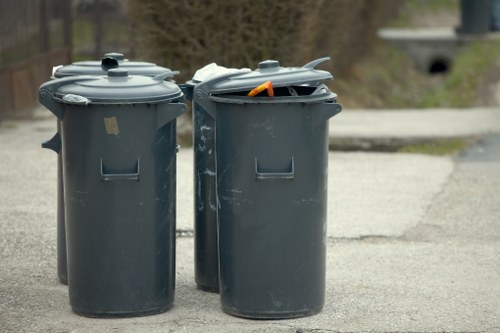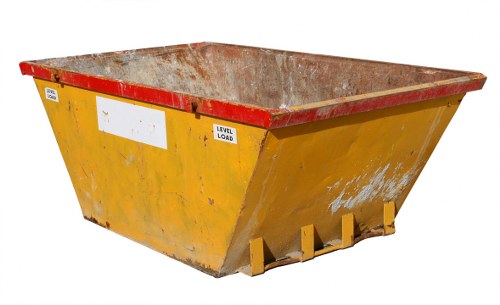Efficient Construction Waste Clearance in Rotherhithe
Understanding Construction Waste Clearance

Construction projects inevitably generate a significant amount of waste. Proper management and clearance of this waste are crucial to maintaining a clean and safe environment. In Rotherhithe, a vibrant area undergoing continuous development, construction waste clearance services play a pivotal role in sustaining the community's aesthetic and environmental standards.
Effective waste clearance not only ensures compliance with local regulations but also promotes sustainable practices by facilitating recycling and proper disposal. Contractors and homeowners alike benefit from professional waste clearance solutions that minimize environmental impact and streamline project timelines.
Choosing the right waste clearance service can greatly influence the success of a construction project. Factors such as reliability, efficiency, and adherence to environmental guidelines are essential considerations when selecting a provider in Rotherhithe.
Types of Construction Waste

Construction waste encompasses a variety of materials generated during the building process. Common types include:
- Concrete and Masonry: Fragments from demolished structures or unused materials.
- Wood: Offcuts and pallets used in construction activities.
- Metals: Scrap metal from structural elements or fittings.
- Plastics and Packaging: Containers, wraps, and other packaging materials.
- Drywall and Insulation: Removed or excess materials from interiors.
Proper categorization and disposal of these materials are essential for efficient waste clearance. Recycling centers in Rotherhithe often accept specific types of waste, reducing the environmental footprint of construction activities.
Understanding the nature of construction waste helps in planning effective clearance strategies. It also aids in identifying opportunities for material reuse and recycling, promoting a circular economy within the construction sector.
Benefits of Professional Waste Clearance

Engaging a professional construction waste clearance service offers numerous advantages:
- Time Efficiency: Experts handle the removal process swiftly, allowing construction to proceed without delays.
- Cost-Effectiveness: Proper waste management can reduce overall project costs by preventing fines and minimizing material disposal expenses.
- Environmental Compliance: Professionals ensure that waste is disposed of in accordance with local regulations, avoiding legal issues.
- Safety: Proper clearance reduces potential hazards on the construction site, promoting a safer working environment.
- Recycling Opportunities: Experienced services identify recyclable materials, contributing to sustainability efforts.
These benefits illustrate why investing in professional waste clearance is a strategic decision for any construction project in Rotherhithe.
Additionally, reputable services often provide tailored solutions to meet the specific needs of a project, enhancing overall efficiency and effectiveness.
Choosing the Right Waste Clearance Service

Selecting an appropriate waste clearance provider in Rotherhithe involves evaluating several key factors:
- Experience: Assessing the provider’s track record and expertise in handling various types of construction waste.
- Licensing and Certification: Ensuring the service meets all regulatory requirements and possesses necessary certifications.
- Range of Services: Looking for comprehensive solutions, including collection, transportation, recycling, and disposal.
- Customer Reviews: Considering feedback from previous clients to gauge reliability and quality of service.
- Pricing: Comparing costs to ensure competitive and transparent pricing structures.
By meticulously evaluating these aspects, contractors and homeowners can select a service that aligns with their project requirements and sustainability goals.
Moreover, a provider’s commitment to eco-friendly practices can significantly enhance the environmental benefits of construction waste clearance.
Environmental Impact and Sustainability

The environmental implications of construction waste clearance are profound. Proper disposal and recycling practices reduce landfill usage, lower greenhouse gas emissions, and conserve natural resources.
Sustainability in waste management involves:
- Maximizing recycling rates by separating materials at the source.
- Utilizing eco-friendly disposal methods to minimize environmental harm.
- Promoting the reuse of materials to extend their lifecycle.
- Implementing waste reduction strategies to prevent unnecessary accumulation.
In Rotherhithe, embracing sustainable waste clearance practices aligns with broader environmental goals and community values. It fosters a greener neighborhood and sets a positive example for future developments.
Adopting these practices not only benefits the environment but also enhances the reputation of businesses and contractors committed to sustainability.
Regulatory Compliance
Local Regulations
Construction waste clearance in Rotherhithe must adhere to local regulations designed to protect the environment and public health. These regulations dictate how different types of waste should be handled, stored, and disposed of.
Non-compliance can result in hefty fines, legal repercussions, and project delays. Therefore, partnering with a compliant waste clearance service ensures that all legal requirements are met, safeguarding your project from potential setbacks.
Staying informed about the latest regulatory changes is also crucial, as guidelines can evolve to address emerging environmental concerns and technological advancements.
Permits and Documentation
Obtaining the necessary permits and maintaining accurate documentation is a critical aspect of construction waste clearance. Proper paperwork verifies that waste is managed responsibly and in accordance with the law.
Professional services typically handle these requirements, alleviating the administrative burden on contractors and ensuring seamless project progression.
Comprehensive documentation also facilitates transparency and accountability, fostering trust between service providers and clients.
Innovative Waste Clearance Solutions
Advanced Recycling Techniques
The construction industry is increasingly adopting advanced recycling techniques to enhance waste management efficiency. These innovations include:
- Automated Sorting Systems: Utilizing technology to accurately separate different types of waste materials.
- Material Recovery Facilities: Specialized plants that process recyclable construction materials.
- On-site Recycling: Implementing processes that allow for immediate recycling at the construction site.
Such innovations significantly reduce the environmental footprint of construction activities and promote a more sustainable approach to waste management.
Implementing these techniques in Rotherhithe can set a benchmark for environmentally responsible construction practices, encouraging widespread adoption across the industry.
Green Waste Clearance Practices
Embracing green waste clearance practices involves minimizing waste generation and maximizing resource efficiency. Strategies include:
- Designing projects with waste reduction in mind.
- Selecting sustainable building materials.
- Encouraging the reuse of materials whenever possible.
- Implementing energy-efficient disposal methods.
These practices contribute to a more sustainable construction ecosystem in Rotherhithe, aligning with global efforts to combat climate change and resource depletion.
Moreover, green practices often result in long-term cost savings and enhanced project sustainability.
Cost Considerations
Budgeting for Waste Clearance
Effective budgeting for construction waste clearance is essential to avoid unexpected expenses and ensure project profitability. Key factors influencing costs include:
- Volume and type of waste generated.
- Distance to disposal or recycling facilities.
- Complexity of the clearance process.
- Regulatory fees and permits.
- Additional services, such as sorting and recycling.
Accurate estimation of these factors facilitates comprehensive financial planning, allowing projects in Rotherhithe to stay within budgetary constraints.
Engaging with service providers early in the planning process can help identify potential cost-saving opportunities and optimize waste management strategies.
Cost-Effective Strategies
Implementing cost-effective waste clearance strategies includes:
- Source Reduction: Minimizing waste generation through efficient design and material selection.
- Recycling and Reuse: Reducing disposal costs by recycling materials and reusing resources where possible.
- Bulk Disposal: Leveraging economies of scale by consolidating waste disposal efforts.
- Negotiating Contracts: Securing favorable terms with waste clearance providers to lower overall costs.
These strategies not only reduce expenses but also enhance the sustainability of construction projects in Rotherhithe.
Adopting a proactive approach to waste management can yield significant financial and environmental benefits over the course of a project.
Community Impact
Maintaining Local Aesthetics
Proper construction waste clearance is vital for preserving the visual appeal of Rotherhithe. Accumulated waste can detract from the area's charm, affecting both residents and visitors.
By ensuring timely and efficient waste removal, construction projects contribute to the overall cleanliness and attractiveness of the neighborhood, fostering a positive community image.
Moreover, well-managed waste clearance prevents potential nuisances such as odors, pests, and unsightly debris, enhancing the quality of life for local residents.
Economic Benefits
Effective waste management practices underpin the economic vitality of Rotherhithe. Streamlined waste clearance processes reduce project delays, allowing for timely completion and occupancy of new developments.
This, in turn, supports local businesses, boosts property values, and attracts further investment into the area.
Additionally, the recycling sector creates job opportunities, contributing to the local economy while promoting sustainable growth.
Future Trends in Waste Clearance
Technological Advancements
The future of construction waste clearance in Rotherhithe is poised for significant advancements driven by technology. Innovations such as:
- Artificial Intelligence: Enhancing waste sorting accuracy and efficiency.
- IoT Devices: Monitoring waste levels and optimizing collection schedules.
- Automation: Streamlining waste handling and transportation.
These technologies promise to revolutionize waste management practices, making them more efficient and environmentally friendly.
Embracing these advancements can position Rotherhithe as a leader in sustainable construction practices, setting standards for other regions to follow.
Policy Developments
Anticipated policy developments are likely to further emphasize sustainability and waste reduction in construction. Potential changes include stricter waste disposal regulations, incentives for recycling, and requirements for sustainable building practices.
Staying abreast of these developments ensures that waste clearance services and construction projects remain compliant and aligned with best practices.
Proactive adaptation to policy changes can provide a competitive advantage, fostering a culture of sustainability within the construction industry in Rotherhithe.
Implementing Best Practices
Effective Planning
Successful construction waste clearance begins with meticulous planning. Key steps include:
- Conducting a waste audit to identify types and quantities of waste.
- Developing a waste management plan tailored to the project's needs.
- Selecting appropriate waste clearance services based on the plan.
- Integrating waste management objectives into the overall project timeline.
Comprehensive planning ensures that waste clearance is handled efficiently, minimizing disruptions and maximizing environmental benefits.
Collaborating with waste clearance providers during the planning phase can enhance the effectiveness of waste management strategies.
Training and Education
Educating construction teams about proper waste management practices is essential for successful clearance. Training programs should cover:
- Identification and segregation of different waste types.
- Proper disposal and recycling procedures.
- Safety protocols related to waste handling.
- Compliance with local regulations and guidelines.
Empowering workers with knowledge and skills fosters a culture of responsibility and accountability, ensuring that waste clearance efforts are sustained throughout the project.
Ongoing education keeps teams informed about the latest best practices and technological advancements in waste management.
Conclusion
Construction waste clearance is a critical component of successful and sustainable building projects in Rotherhithe. By partnering with professional waste clearance services, adhering to best practices, and embracing innovative solutions, the construction industry can significantly reduce its environmental footprint and contribute to the community's wellbeing.
Investing in efficient waste management not only ensures compliance with regulations but also enhances project efficiency, safety, and economic viability. As Rotherhithe continues to grow and develop, prioritizing responsible waste clearance will be essential in fostering a thriving and sustainable environment for all.
Contact us today to learn more about our construction waste clearance services and how we can support your next project in Rotherhithe.